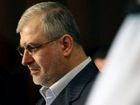Spotlight
President Joseph Aoun said Tuesday that the decision to ban Hezbollah's military activities is "irreversible", as the Iran-backed movement claimed responsibility for new attacks targeting Israeli positions.
Speaking to members of the Quintet -- a committee made up of the French, U.S., Qatari, Saudi Arabian, and Egyptian ambassadors -- the president called the decision "final," after a Hezbollah on Monday night lambasted the state's "impotence in the face of the brutal Zionist enemy".
Full StoryThe Israeli military said it struck assets of a financial institution on Monday already sanctioned by Washington for funding Hezbollah activities.
"A short while ago, the (Israeli military) completed a wave of strikes against the Al-Qard Al-Hassan Association, which funds the Hezbollah terrorist organization throughout Lebanon," the military said, without specifying where the strikes were carried out.
Full StoryA Cypriot government source told AFP on Monday that Iranian-made drones that targeted a British military base in Cyprus had been launched from nearby Lebanon, probably by Hezbollah.
The source said "it has been confirmed" the drones -- one of which struck a runway -- had set off from Lebanon. When asked if the Iran-backed militant group had launched them, they replied "most likely".
Full StoryThe Israeli military issued new evacuation orders for dozens of locations in Lebanon on Tuesday, including warning residents in two southern Beirut neighborhoods to stay away from several buildings ahead of an imminent operation.
"Urgent warning to the residents of Lebanon, specifically in the villages which names are shown," said a statement by the military's Arabic-language spokesman Avichay Adraee on Telegram, which listed 50 locations.
 Full Story
Full Story
The Israeli military said Tuesday it had deployed troops to several locations in southern Lebanon, in what it described as a "forward defense" measure along the border.
"We have positioned soldiers on the border area in additional points to defend our civilians, to prevent Hezbollah from attacking them," military spokesman Lieutenant Colonel Nadav Shoshani told journalists in a briefing.
Full StoryLoud explosions were heard in Beirut on Monday evening, as Lebanese state media reported strikes on the capital's southern suburbs after the Israeli military said it struck 70 Hezbollah targets.
AFP journalists heard loud blasts in the city. The state-run National News Agency said "enemy warplanes launched new raids on the southern suburbs".
 Full Story
Full Story
Israel struck Lebanon on Monday as Iranian counterattacks hit Gulf states and a British base in Cyprus. International gas prices rose and shares went down.
Several strikes hit south and east Lebanon and Beirut's southern suburbs after Israeli evacuation warnings. The Palestinian Islamic Jihad's armed wing said its commander in Lebanon was killed in the strikes.
 Full Story
Full Story
The Palestinian Islamic Jihad’s armed wing said on Monday that its commander in Lebanon was killed in Israeli strikes on Beirut’s southern suburbs.
In a statement, the Quds Brigades said Adham Adnan al-Othman, the head of the armed wing in Lebanon, was killed "as a result of the treacherous Zionist aggression that targeted the southern suburbs of Beirut, at dawn on Monday".
 Full Story
Full Story
Hezbollah condemned on Monday the government's decision to ban its military activities, while Israel carried out retaliatory strikes in response to rockets fired by the Iran-backed group.
In a statement, Mohammad Raad, the head of the group's parliamentary bloc, condemned Beirut's "swaggering decisions", saying that "the Lebanese were expecting a decision rejecting the (Israeli) aggression".
 Full Story
Full Story
The U.S. Embassy in Lebanon renewed its call for citizens to leave Lebanon immediately as the Middle East war expanded to Lebanon.
 Full Story
Full Story



